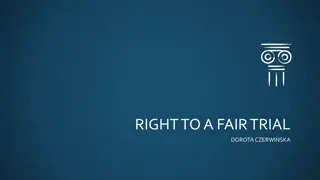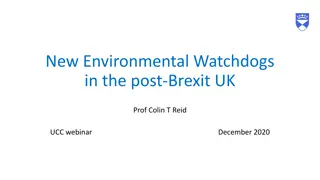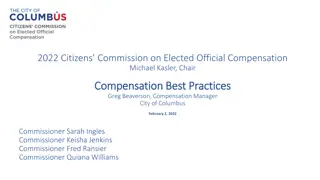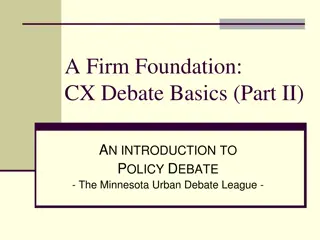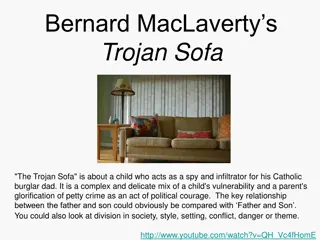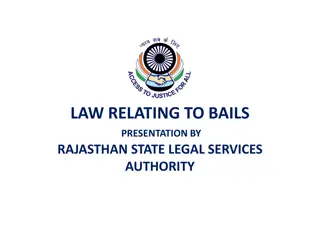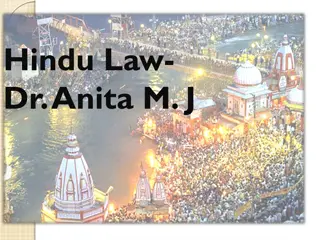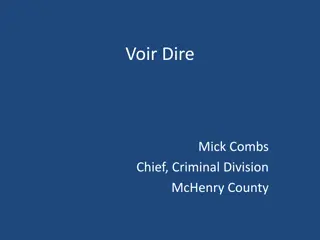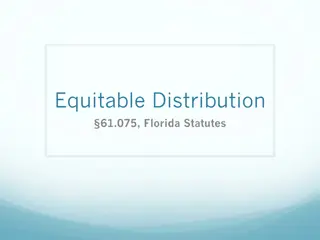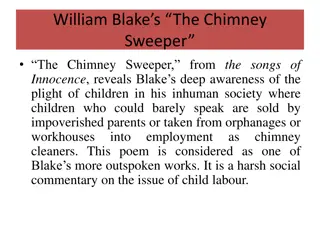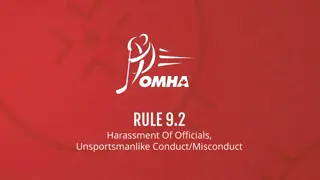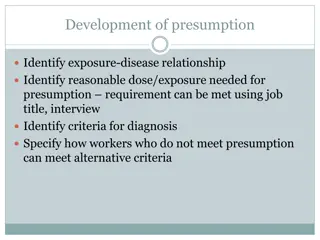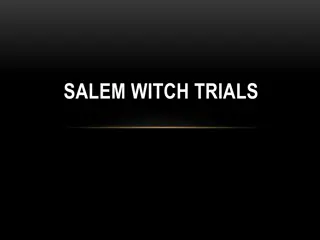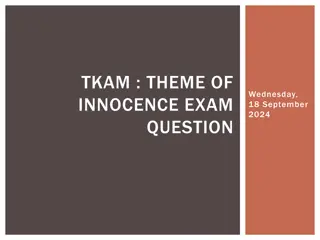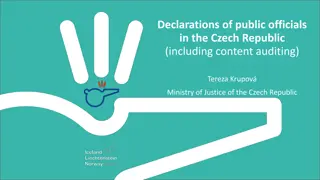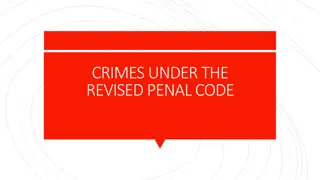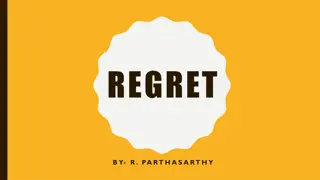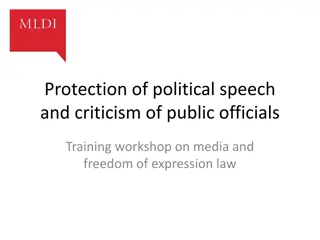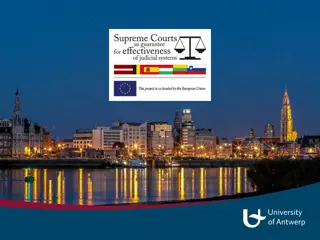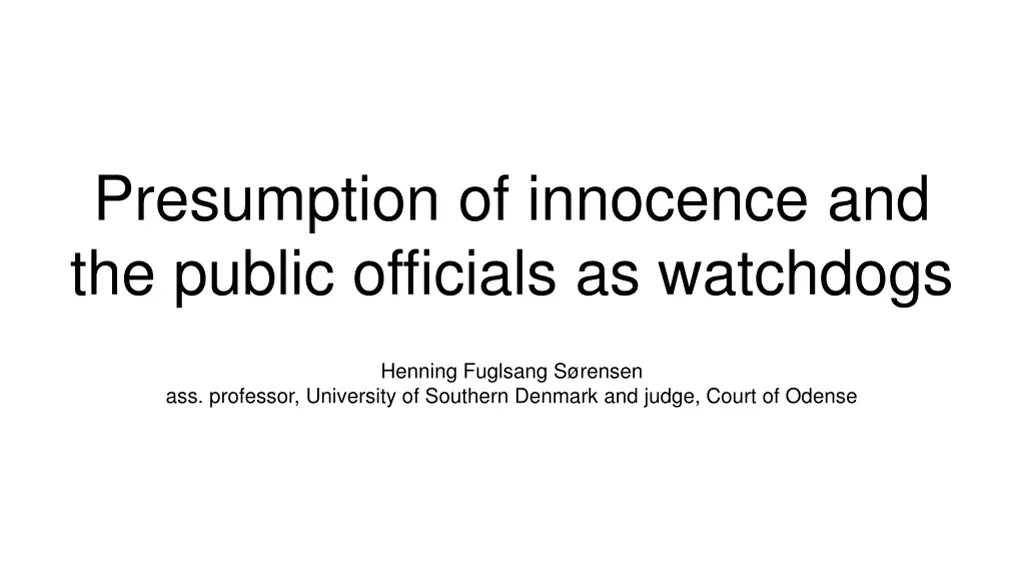
Presumption of Innocence in Legal Frameworks
Explore the significance of the presumption of innocence in legal systems, focusing on relevant laws and directives such as the European Convention on Human Rights, the Charter of Fundamental Rights, and Directive (EU) 2016/343. Understand the rights of the accused and the responsibilities of public authorities in criminal proceedings.
Download Presentation

Please find below an Image/Link to download the presentation.
The content on the website is provided AS IS for your information and personal use only. It may not be sold, licensed, or shared on other websites without obtaining consent from the author. If you encounter any issues during the download, it is possible that the publisher has removed the file from their server.
You are allowed to download the files provided on this website for personal or commercial use, subject to the condition that they are used lawfully. All files are the property of their respective owners.
The content on the website is provided AS IS for your information and personal use only. It may not be sold, licensed, or shared on other websites without obtaining consent from the author.
E N D
Presentation Transcript
Presumption of innocence and the public officials as watchdogs Henning Fuglsang S rensen ass. professor, University of Southern Denmark and judge, Court of Odense
European Convention on Human Rights Art. 6(2): Everyone charged with a criminal offence shall be presumed innocent until proved quilty according to law.
Charter of Fundamental Rights Article 52 (4). In so far as this Charter contains rights which correspond to rights guaranteed by the Convention for the Protection of Human Rights and Fundamental Freedoms, the meaning and scope of those rights shall be the same as those laid down by the said Convention. This provision shall not prevent Union law providing more extensive protection.
Charter of Fundamental Rights Article 48. Presumption of innocence and right of defence 1. Everyone who has been charged shall be presumed innocent until proved guilty according to law. 2. Respect for the rights of the defence of anyone who has been charged shall be guaranteed.
Directive (EU) 2016/343 Article 4(1). Member States shall take the necessary measures to ensure that, for as long as a suspect or an accused person has not been proved guilty according to law, public statements made by public authorities, and judicial decisions, other than those on guilt, do not refer to that person as being guilty. This shall be without prejudice to acts of the prosecution which aim to prove the guilt of the suspect or accused person, and to preliminary decisions of a procedural nature, which are taken by judicial or other competent authorities and which are based on suspicion or incriminating evidence.
Directive (EU) 2016/343 Article 4(3). The obligation laid down in paragraph 1 not to refer to suspects or accused persons as being guilty shall not prevent public authorities from publicly disseminating information on the criminal proceedings where strictly necessary for reasons relating to the criminal investigation or to the public interest.
Directive (EU) 2016/343 Preambel 16: The presumption of innocence would be violated if public statements made by public authorities [ ] referred to a suspect or an accused person as being guilty, for as long as that person has not been proveed guilty according to law. Such statements [ ] should not reflect an opinion that that person is guilty. [...]
Directive (EU) 2016/343 Preambel 17: The term public statements made by public authorities should be understood to be any statement which refers to a criminal offence and which emanates from an authority involved in the criminal proceedings concerning that criminal offence, such as judicial authorities, police and other law enforcement authorities or from another public authority such as ministers and other public officials, it being understood that this is without prejudice to national law regarding immunity.
Directive (EU) 2016/343 Preambel 18: The obligation not to refer to suspects or accused persons as being guilty should not prevent public authorities from publicly disseminating information on the criminal proceedings where this is strictly necessary for reasons relating to the criminal investigation, such as when video material is released and the public is asked to help in identifying the alleged perpetrator of the criminal offence, or to the public interest, such as when, for safety reasons, information is provided to the inhabitants of an area affected by an alleged environmental crime or when the prosecution or another competent authority provides objective information on the state of criminal proceedings in order to prevent a public order disturbance.
Directive (EU) 2016/343 Preambel 18 (cont.): The use of such reasons should be confined to situations in which this would be reasonable and proportionate, taking all interests into account. In any event, the manner and context in which the information is disseminated should not create the impression that the person is guilty before he or she has been proved guilty according to law.
Directive (EU) 2016/343 Preambel 19: Member States should take appropriate measures to ensure that, when they provide information to the media, public authorities do not refer to suspects or accused persons as being guilty for as long as such persons have not been proved guilty according to law. To that end, Member States should inform public authorities of the importance of having due regard to the presumption of innocence when providing or divulging information to the media. This should be without prejudice to national law protecting the freedom of press and other media.
What is established? ECHR art. 6(2) = CFF art. 48(1). Directive 2016/343, art 4(1), prohobits public authorities to make statements of guilt. Directive 2016/343, art. 4(3), allows public authorities to [...] publicly disseminating information on the criminal proceedings where strictly necessary for reasons relating to the criminal investigation or to the public interest. Directive 2016/343, preambel 17: public authorities are judicial authorities, police and other law enforcement authorities or another public authority such as ministers and other public officials.
What is missing? ECHR art. 10(1). Everyone has the right to freedom of expression. This right shall include freedom to hold opinions and to receive and impart information and ideas without interference by public authority and regardless of frontiers. This article shall not prevent States from requiring the licensing of broadcasting, television or cinema enterprises.
What is missing? ECHR art, 10(2). The exercise of these freedoms, since it carries with it duties and responsibilities, may be subject to such formalities, conditions, restrictions or penalties as are prescribed by law and are necessary in a democratic society, in the interests of national security, territorial integrity or public safety, for the prevention of disorder or crime, for the protection of health or morals, for the protection of the reputation or rights of others, for preventing the disclosure of information received in confidence, or for maintaining the authority and impartiality of the judiciary.
What is missing? ECHR art. 8(1). Everyone has the right to respect for his private and family life, his home and his correspondence.
What is missing? ECHR art. 8(2). There shall be no interference by a public authority with the exercise of this right except such as is in accordance with the law and is necessary in a democratic society in the interests of national security, public safety or the economic well-being of the country, for the prevention of disorder or crime, for the protection of health or morals, or for the protection of the rights and freedoms of others.
What is the problem? Public authorities must respect the presumption of innocence when making statements on criminal case but The citizens must rest asure that criminal offences are being investigated and brought to judice; While the suspect have a right to respect for his private life and thus information about possible criminal offences. => public authorities are the watchdogs that protect the rule of law by reassuring that criminal offences are investigated and prosecuted and by telling about it in respect of the right to respect for private life!
Directive (EU) 2016/343 Preambel 18: The obligation not to refer to suspects or accused persons as being guilty should not prevent public authorities from publicly disseminating information on the criminal proceedings where this is strictly necessary for reasons relating to the criminal investigation, such as when video material is released and the public is asked to help in identifying the alleged perpetrator of the criminal offence, or to the public interest, such as when, for safety reasons, information is provided to the inhabitants of an area affected by an alleged environmental crime or when the prosecution or another competent authority provides objective information on the state of criminal proceedings in order to prevent a public order disturbance.
The question is... whether preambel 18 to directive 2016/343 restricts the possibilities for public authorities to inform the public about investigation and prosecution of criminal offences in a manner that may be in conformity with ECHR art 10(1) or How can the citizens rest asure that public authorities are the watchdogs that ensure the rule of law if they only can inform the public when it is strictly necessary ?

